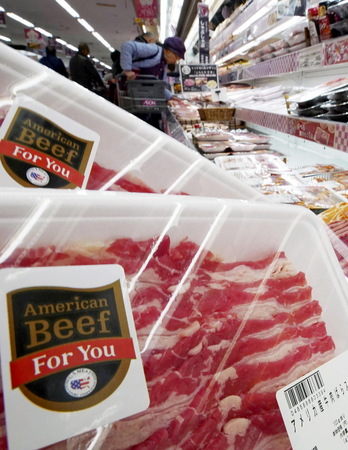Japan-U.S. trade pact to take effect, lowering beef prices

TOKYO - A Japan-U.S. trade agreement that will go into effect on Jan. 1, 2020, will benefit Japanese consumers, partly because Japan’s tariffs on beef will be lowered. On the other hand, domestic livestock farmers will face intense competition due to imported products.
Tariffs on U.S. beef imports, which currently stand at 38.5%, will be lowered to 26.5% when the pact goes into effect, making import prices cheaper. Some retailers are taking advantage of this business opportunity to boost sales.
Major supermarket chain Aeon Retail Co. plans to launch sales promotions centering around U.S. beef starting in January of next year.
“We will have events that will allow customers to feel the affordability of these products,” said a person in charge of the events, though how much lower the price will be is still undecided.
In addition, consumer expectations are high, due to it being the season when beef for sukiyaki becomes more in demand. “When I eat U.S. beef, I grill it or put it in my curry,” a 47-year-old self-employed man said. “I’d be grateful if the price of beef were much cheaper.”
The United States has famous vineyards, including in California. For U.S. wines, the 15% or 125 yen per-liter tariff will be reduced in stages, going to zero in fiscal 2025. Supermarket chain operator Seijo Ishii Co. will lower the prices of about 70 types of products from California wines to U.S. nuts and peanut butter between Jan. 10 and 26. The company will consider reviewing the price of U.S. products after the events.
However, there is a possibility that domestic beef prices will go down or beef production will shrink, if the volume of cheaper U.S. beef increases in the country.
The Agriculture, Forestry and Fisheries Ministry estimated that the enforcement of the pact would lead to a reduced beef output of ¥23.7 billion to ¥47.4 billion. Dairy farmers will be required to cut costs in order to remain competitive.
Tariffs on cars next to discuss
Tokyo and Washington have agreed to discuss which fields should be renegotiated within four months after the pact goes into effect. Momentum in the Japanese government ahead of negotiations and discussions is not rising, though Japan is expected to ask the United States to eliminate tariffs on imported automobiles and car parts from Japan, one of the fields where negotiation will continue.
However, there is a sense of caution that Washington will try to impose additional tariffs up to 25%, if Tokyo demands it abolish tariffs. Many people in the Japanese car industry said, “[The government] should prioritize the avoidance of additional tariffs rather than the elimination of tariffs on passenger cars which currently stands at 2.5%.”
In the U.S. industry, there are strong opinions that the pact is insufficient, and the United States should aim to agree on a more comprehensive deal.
At a hearing conducted by the U.S. House of Representatives in November, a senior official at the United Automobile Workers voiced dissatisfaction with the fact that the pact didn’t include a foreign exchange clause which restricts a move to push the value of currency lower.
It is not easy for both countries to make concessions on “sensitive” products such as automobiles for the United States and rice for Japan. “I am skeptical that either side will be willing to make … stage-two negotiations a priority in 2020,” Matthew Goodman, a senior adviser at the Center for Strategic and International Studies, said regarding a Japan-U.S. meeting, and pointed out at the hearing that the United States has priorities including a negotiation with China in its trade policy.
